|
As readers of my blog will have gathered, I'm an avid Stephen King fan; I'm working my way through all his supernatural thrillers. Apart from 'Nightmares and Dreamscapes' and the rather flat 'From a Buick 8', I've not yet read anything from King I haven't liked. So when I spotted the hardcover copy of 'End of Watch' in the supermarket, I bought it straight away. The novel is the final book in the Bill Hodges trilogy, the other two being 'Mr Mercedes' and 'Finders Keepers'. Here's my review of 'Mr Mercedes'; I didn't post a review for 'Finders Keepers', but I loved that one as well. 'End of Watch', eh? An intriguing title 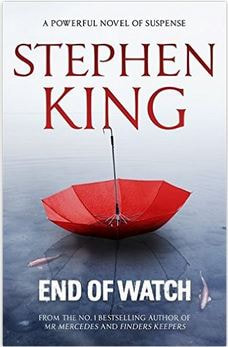 The title, one that fits the story perfectly, comes from an American expression for police officers at the end of their working life. Those who retire permanently, or die. Which one will Bill Hodges do? He's certainly an engaging sleuth, although a somewhat stereotypical one: retired police officer, divorced, battling health problems and with a past drinking problem. He's teamed with Holly Gibney, a woman with multiple issues of her own, along with Jerome Robinson, a student and former lawn boy for Bill. Books one and three of the trilogy concentrate heavily on the evil Brady Hartsfield, a mass murderer who's also obsessed with suicide. The middle novel, 'Finders Keepers', diverts to explore one of King's favourite topics, the writing life, although it involves the Brady Hartsfield character as well. Here's the sales blurb for 'End of Watch': 'Retired Detective Bill Hodges now runs a two-person firm called Finders Keepers with his partner Holly Gibney. They met in the wake of the 'Mercedes Massacre' when a queue of people was run down by the diabolical killer Brady Hartsfield. Brady is now confined to Room 217 of the Lakes Region Traumatic Brain Injury Clinic, in an unresponsive state. But all is not what it seems: the evidence suggests that Brady is somehow awake, and in possession of deadly new powers that allow him to wreak unimaginable havoc without ever leaving his hospital room. When Bill and Holly are called to a suicide scene with ties to the Mercedes Massacre, they find themselves pulled into their most dangerous case yet, one that will put their lives at risk, as well as those of Bill's heroic young friend Jerome Robinson and his teenage sister, Barbara. Brady Hartsfield is back, and planning revenge not just on Hodges and his friends, but on an entire city. The clock is ticking in unexpected ways... Both a stand-alone novel of heart-pounding suspense and a sublimely terrifying final episode in the Hodges trilogy, 'End of Watch' takes the series into a powerful new dimension.' Absorbing characters, pink fish and a fast pace Sounds great, doesn't it? And 'End of Watch' delivers the goods. Brady Hartsfield is a wonderfully warped villain, aided by his sidekicks Felix Babineau and Library Al, both of whom end up zombie-fied after Brady invades their minds. Intent on revenge on Bill Hodges, Brady will stop at nothing to achieve his goal, as well as drive thousands of young people to kill themselves. Although his brain was seriously damaged by Holly Gibney, Brady avails himself of new powers, possibly resulting from Felix Babineau using him in unauthorised drug trials. King also hints that the savage head blow dealt by Holly may also have contributed, allowing Brady to access the 90% of his brain that lies dormant in all of us. As his extraordinary powers grow, the deaths begin… Stephen King is a master at creating memorable characters (think Jack Torrance, Annie Wilkes, Jake Epping). 'End of Watch' also has an interesting cast list, one that develops both Bill Hodges and Holly Gibney, more so the latter. Whilst it's not specifically mentioned, Holly is either autistic or has Asperger's syndrome, and the book shows her shedding her coping mechanisms as the story progresses. It's Brady Hartsfield, though, who receives the full Stephen King treatment, morphing from a catatonic invalid to a mind in motion, capable of transferring into other bodies at will. His evil mission poses a huge problem for Bill and Holly in their race to stop him. They can hardly tell the police what they suspect Brady is up to, after all! I found some aspects of the plot a little far-fetched - the use of obsolete games consoles to facilitate mind control, for example, and the numerical pink fish. Perhaps that's a little unfair, as Brady's opportunities for evil are limited initially, and the use of technology, albeit outdated, fits what we already know of him as a computer expert. Besides, this is Stephen King, creator of Pennywise the Dancing Clown, supernatural cars and telekinetic teenagers. Beside them, digital pink fish seem small fry! King can be verbose at times, but his mastery of words transcends what might grate if coming from a lesser writer. 'End of Watch' rollicks along at a fast pace towards the satisfying, if sad, conclusion. It can be read either as the third book in the 'Mr Mercedes' trilogy, or would work equally well as a standalone novel. If you're a fan of his novels, I suspect you'll love this book. What about you? Have you read 'End of Watch', or any of the other books in the trilogy? What did you think? Leave a comment and let me know!
0 Comments
A novel told backwards! 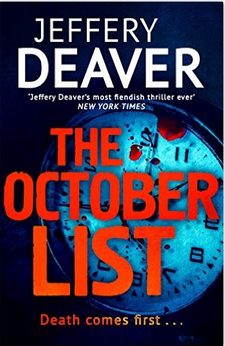 A while back, I wrote a post about novels with unusual structures (you can read it here), examining books such as B S Johnson's 'The Unfortunates', which consists of twenty-seven chapters that can be read in any order. As a novelist, I'm fascinated by examples of authors stretching the boundaries of what's possible with fiction. Last week, I picked up from the library another novel with an intriguing premise: Jeffery Deaver's 'The October List'. What's unusual about it? Well, the story is told in reverse - sounds weird, I know! The index begins with chapter thirty-six, the story working back through time over the last two days to the first chapter. In his foreword, Deaver explains that he became captivated with the idea of reverse chronology after listening to a radio discussion about Stephen Sondheim's musical 'Merrily We Roll Along', which uses the same idea. Deaver says: 'I began to wonder if it was possible for a thriller writer to pull off a backward-told story that was filled with the cliff-hangers, surprises and twists and turns that are, to me, the epitome of good crime fiction. The task of course, is to present the twist before giving the facts that lead up to it and still make the surprise thrilling. It's like telling a joke's punch line first, yet still making the audience laugh as hard as if they'd heard the gag in its proper order.' Part brilliance, part ho-hum  Author Jeffery Deaver Author Jeffery Deaver So does Deaver succeed? Yes and no, and that reflects the range of reviews I've read about the book on Amazon. For the majority of the novel I wasn't that impressed. The characters lacked depth, Deaver giving only the barest details about them, and the writing failed to grab me. Along the way, there are surprises, but no major thrills or twists. In addition, the ending of the opening chapter (number thirty-six, which appears first in the book as this is a story told in reverse) would have been weak had the plot been conventionally ordered, not delivering the final punch thriller readers expect. Whoever reviewed the book for The Sunday Times appears to have the same reaction, saying: 'Even halfway through, it seems possible that Deaver has been defeated by the mind-boggling technical challenge of delivering surprises in back-to-front time.' Towards the end, however, everything changes, and I found myself gripped by the twists that Deaver throws into the mix. So does our friend from The Sunday Times: 'After the reverse journey reaches the couple's first meeting, his (Deaver's) gamble is thoroughly vindicated by a series of twists in which he resembles a conjuror who each time seems to have performed his final trick, but then tops it.' My reaction as well! The final two chapters are particularly gripping, delivering surprises that perhaps I should have seen coming but didn't. By the end, the last part of the book left me thinking, 'Wow!', as well as unsure how to sum it up as a whole. 'The October List' is, by its very nature, plot-driven yet that's no excuse for poorly drawn characters or pedestrian writing. Yet I'm filled with admiration for any novelist who attempts such an ambitious task. Could you conceive of writing a novel backwards?! Deaver says in his foreword that 'The October List' was more challenging than anything he'd previously written - hardly surprising! Have you read 'The October List'? I'd be interested to hear what other people think. What's your opinion of 'The October List'? Do you, like one five-star Amazon reviewer, consider it 'brilliantly executed' with 'more surprises than you can shake a stick at'? Or do you side with the one-star reviewer who says, cuttingly, 'An intriguing idea wasted'? Leave a comment and let me know!
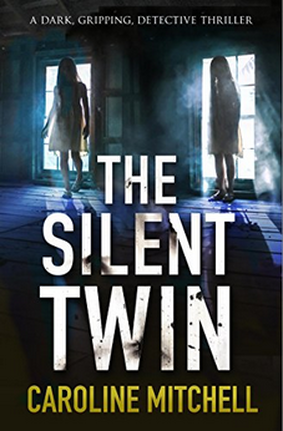 This time around my weekly post will be another book review - 'The Silent Twin', Caroline Mitchell's third release in the Jennifer Knight series. Caroline blends crime fiction with a dash of the supernatural, as the protagonist Jennifer Knight has a dual role in the police force. Besides her more orthodox work, part of her job is to investigate crimes with, as Mitchell puts it, 'an unearthly edge'. Sounds intriguing, and not a plot premise I've encountered before! Here's the description from the back cover: Nine-year-old twins Abigail and Olivia vow never to be parted. But when Abigail goes missing from Blackwater Farm, DC Jennifer Knight must find her before it’s too late. Twin sister Olivia has been mute since Abigail’s disappearance. But when she whispers in Jennifer’s ear, Jennifer realises it is Abigail’s voice pleading to be found. A damp and decaying house set in acres of desolate scrubland, the farm is a place of secrets, old and new – and Jennifer must unravel them all in order to find the lost girl. But could Olivia’s bond with her twin hold the key to finding Abigail? And can Jennifer break through her silence in time to save her sister’s life? A detective thriller with a spooky twist  Author Caroline Mitchell Author Caroline Mitchell I wasn't sure how well blending a supernatural angle with a detective thriller would work. Also, as 'The Silent Twin' is the third in its series, whether it would also read well as a standalone. (I won my copy in a competition, which is why I've not yet read the first two Jennifer Knight books). My fears were unfounded. The supernatural element adds interest to the plot without becoming obtrusive or forcing the book to sit between two genres. If I'm reading crime fiction, I don't expect overtones of a Stephen King horror story, for example, but that doesn't happen in 'The Silent Twin'. First and foremost, it's a detective thriller, with the supernatural element acting to complement, not hinder, that. The reader is never allowed to forget that a child is missing, with all the horror that entails for her family. Also, I was relieved to find 'The Silent Twin' works well on its own merits and prior knowledge of the first two books in the series wasn't necessary. Caroline Mitchell does a fantastic job of setting the scene when it comes to creepiness The parents of the missing child live at Blackwater Farm, a dilapidated dwelling set in a remote area and complete with a strong negative energy within its walls. As the wind howls outside, Jennifer Knight hears Abigail whispering in her ear, begging to be found. What exactly is she hearing, though? Is the child still alive and her pleas the product of Jennifer's imagination, or is there a more sinister explanation? Could Abigail be dead and is it her spirit that is desperate for resolution? Her twin, Olivia, is every bit as enigmatic, refusing to speak immediately after her sister's disappearance but when she does begin to talk again, she drops hints that she knows a lot more than she's willing to tell. For example, what is the awful thing she saw, but promises her father, Nick, not to reveal? What demons is Nick wrestling with? The other characters are equally engrossing. What past traumas have scarred Joanna, the twins' mother? Why has her marriage to Nick turned sour? What part does the mysterious Radcliffe play? And who is the writer of the mysterious diary? As the action progresses, the spotlight turns on each one, revealing dark secrets, past abuses and terrible tragedy. I read 'The Silent Twin' in one sitting, delighted to have discovered a new author whose books I can enjoy. If the idea of a detective thriller with a spooky twist appeals to you, I heartily recommend this novel. Want to find out more about Caroline and her books? You can discover more, including details of Don't Turn Around (Book 1) and Time to Die (Book 2) via Caroline's author page on Amazon: Caroline Mitchell.
An engrossing 'straight-up' crime thriller from a master wordsmith 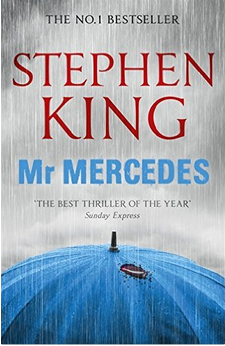 It's been a while since I wrote a book review, and 'Mr Mercedes' by Stephen King is a worthy way to resume! The novel is King's venture into straight crime thrillers, the first of a trilogy. Fans of his horror and supernatural titles won't find their familiar fare here. No clowns, no haunted hotels, no Boo'ya Moon. Instead 'Mr Mercedes' recounts the good versus evil battle of Bill Hodges, a retired police officer, and Brady Hartsfield, a computer genius with a bad Oedipal complex and an even worse loathing of humanity. The book begins with a bang, recounting the senseless slaying of eight people by Brady Hartsfield, committed by ploughing a stolen Mercedes into a crowd. Years later, retired detective Bill Hodges's failure to capture the Mercedes Killer haunts him as he drifts through his days on a diet of junk food and daytime television. Then he receives a taunting letter from Mr Mercedes, an attempt to goad him into suicide. Instead, it induces the opposite effect, Hodges is spurred into action, committed to capturing the killer before he strikes again. Let the battle commence.... The novel has more twists and turns than a maze, never failing to thrill. Twice in the book (I'll not say more as I don't want to give plot spoilers) the events had me yelling, 'Oh my God!' at the pages. The way King enables Hartsfield to stalk Hodges without the latter realising is creepy beyond belief. Novelists are often advised to torture their characters to excite readers. In 'Mr Mercedes', Stephen King doesn't hesitate to dispatch the modern day equivalent of the Spanish Inquisition to persecute his players. Speaking of whom, 'Mr Mercedes' introduces a trio of characters that continue through the trilogy. First Bill Hodges, the man who rediscovers his zest for life through hunting Brady Hartsfield. Jerome Robinson, the computer-savvy student, a foil for Hodges's technical ineptitude. Finally, there's Holly Gibney, a seemingly minor character whose demons seem destined to hinder Hodges, not help him. The lesser characters are equally compelling. Deborah Hartsfield, Brady's alcoholic mother, inspires empathy as we learn the reason for her drinking. At the same time, her unorthodox relationship with her disturbed son won't win her a 'Mother of the Year' award. Aunt Charlotte is a master study of a self-absorbed whiner engorged with entitlement issues. The only character I disliked (although she's one of the 'good guys') is Janelle Patterson. Her condescending attitude towards Hodges warrants a kick up the backside. She dispenses sexual favours his way as though rewarding a well-trained dog with a ham bone. Yuk. A dash of humour, and less is not always more...  Novelist Stephen King Novelist Stephen King Unlike many straight-up crime thrillers, the novel is laced with humour. Take our introduction to Bill Hodges. He's at a point in his life when blowing his brains out holds increasing appeal. We witness his ennui via the daytime television shows with which he self-medicates. King's descriptions of a trashy reality TV programme are hilarious, yet provide a not-so-subtle commentary on modern life. His books have often been criticised for being long-winded. By comparison to some of his work ('Under the Dome', 'The Stand', etc.), 'Mr Mercedes', at 405 pages, is a short read. Yet it still contains much that critics might say could be axed without interfering with the plot. Take the description of the reality TV show. The fighting between Knockout Bods One and Two and their shared lover doesn't add to the action, reveals nothing about the book's characters. Yet somehow it works. Those passages inject humour, a counterpoint to the awfulness of Hodges's life post-retirement. Yes, King is prone to lengthy prose, some of which doesn't add to his books. With a master wordsmith like him, though, it doesn't detract either. The man is probably capable of rewriting the phone book and making it thrilling. His wizardry with words ensures that, no matter what tangent he zooms off on, it'll be entertaining. 'Mr Mercedes' is the first in a trilogy, and the second and third books, 'Finders Keepers' and 'End of Watch', have already been published. Our heroic trio of Hodges, Robinson and Gibney continue their crime-fighting spree, this time tackling an obsessive fan whose preoccupation with a famous writer goes too far. Wait - haven't we been there before? Annie Wilkes in 'Misery'? King seems to enjoy examining the trials and tribulations of a novelist ('Misery', 'Lisey's Story', 'Bag of Bones', etc.). 'Finders Keepers', however, in King's capable hands, spins an original twist on a familiar theme. And 'End of Watch' delves into what appears to be a murder-suicide. Except that matters aren't, of course, what they seem... Back to 'Mr Mercedes'. I devoured this book, loving the ride on which King takes the reader. The only part that didn't gel for me was the final scene, which I thought stretched credibility too far. On the other hand, in its own way it's oddly humorous. Given how I loved the rest of the book, it's a minor issue. And now, thanks to Messrs King and Mercedes, I know what a crush freak is. Believe me, if I could erase that particular piece of knowledge from my brain, I would! Have you read 'Mr Mercedes'? I hope you enjoyed this book review! Have you read 'Mr Mercedes'? Did you enjoy it as much as I did? Thoughts, opinions? Leave a comment and let me know!
The Jack Reacher series - classy, page-turning thrillers 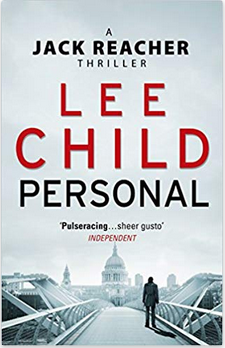 I've been a fan of Lee Child's Jack Reacher titles from the first one I read. Hats off to Mr Child (real name Jim Grant), who has mastered writing bestselling American thrillers, despite being British. He pens classy novels with a twist and a turn in every chapter, books that make me eager to turn to the next page. This week I'll be reviewing his novel 'Personal', published in 2014. First, however, a little about the Reacher series in general. Jack Reacher is an iconic character; tall, tough, an expert fighter, he wanders his home country of America with only a toothbrush and wallet in his pocket. He even spurns carrying a change of clothes, preferring to buy fresh attire as and when he needs it. He has no home, no car, no friends, no significant other, just a desire to live life off the grid and on his own terms. Reacher explores his homeland without so much as a holdall, claiming that if he were to allow possessions into his life, it would open the door to more... and more... and more. Which might lead to acquiring a house for all those possessions, and being settled is exactly what Reacher seeks to avoid. The girls, the gadgets, the witty one-liners....In terms of plot, the Reacher books are virtually identical. The novels are, as Child has remarked, essentially revenge stories – somebody does something bad, and Reacher exacts retribution. The plotline and location varies from title to title, but certain elements stay the same. That's not necessarily a bad thing, and I suspect Child employs this strategy for commercial reasons. Why? Because such tactics work. Take the James Bond movies. No matter who the latest Bond actor is, cinema goers know exactly what they'll get for their money. The girls, the gadgets, the witty one-liners... the basic plotline may vary, but the action and adventure remain constant. Guaranteed entertainment. It's no different with Lee Child's novels. In many ways, I see similarities between James Bond and Jack Reacher. Reacher's as tough as Bond, if not more so. A towering six feet five inches of fighting prowess, he tends to tackle the bad guys in multiples, often taking on five or six men at once and leaving them dead or hospital cases. All the while offloading witty wisecracks - our man's verbally every bit as cool as James Bond. We all love Bond's laconic one-liners, but Reacher can come out with some gems of his own as he bats his ripostes across the conversational table. Take this example of his dry humour: 'I have no desire to go to Buckingham Palace anyway.' 'Wouldn't you like to meet the Queen?' 'Not really. She's just a person. We're all equal. Has she expressed any interest in meeting me?' Entertainment, pure and simple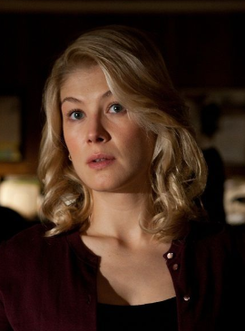 Helen Rodin, one of Reacher's conquests Helen Rodin, one of Reacher's conquests In addition, similar to Bond, Reacher always hooks up with a beautiful, beguiling female; Child's subplots are often concerned with the sexual tension that develops between the two. The epitome of machismo, Reacher is nevertheless portrayed as respectful towards women, despite his 'love 'em and leave 'em' attitude. Not that the latter matters. His cohorts aren't, on the whole, looking for a white picket fence; they're equally happy to enjoy some uncomplicated pleasure. Entertainment, pure and simple, for Jack, his women, and the reader. Let's turn now to gadgets. Our hero has an encyclopaedic knowledge of weaponry, although he's a dinosaur when it comes to technology. Despite lacking Bond's fancy gizmos, Reacher employs any guns he comes across to great effect. He knows all about ballistics and firing strategies, facts ground hard into him during his years as a military policeman, and he uses his knowledge well, explaining it to the reader in a way that's never dull. And he's also a mean opponent with his fists and feet. You wouldn't want to piss off this guy, believe me. What about his morality? Like Bond, Jack has no compunction about killing another human should the circumstances warrant it. I've read criticism of Lee Child for this, along the lines of how a cold-blooded murderer can't be a hero. I believe that's over-thinking the issue. Child's books are written to entertain, and I doubt anyone would level the same comment at James Bond, simply because he holds a licence to kill and Reacher doesn't. We're not meant to go all moralistic about Child's protagonist. Besides, Reacher has no trouble justifying his actions, either to himself or to others. Take this excerpt from 'Personal', in which he explains his attitude to killing one of the guys sent to apprehend him: 'He had a choice... he could have spent his days helping old ladies across the street. He could have volunteered in the library. I expect they have a library here. He could have raised funds for Africa, or wherever they need funds these days. He could have done a whole lot of good things. But he didn't. He chose not to. He chose to spend his days extorting money and hurting people. Then finally he opened the wrong door, and what came out at him was his problem, not mine. Plus he was useless. A waste of good food. Too stupid to live.' 'The stakes have never been higher...because this time, it's personal.' 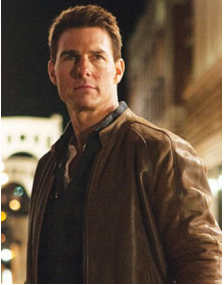 Tom Cruise as Jack Reacher Tom Cruise as Jack Reacher On to the book review itself. Here's what Amazon says: 'Jack Reacher walks alone. Once a go-to hard man in the US military police, now he’s a drifter of no fixed abode. But the army tracks him down. Because someone has taken a long-range shot at the French president. Only one man could have done it. And Reacher is the one man who can find him. This new heart stopping, nail biting book in Lee Child’s number-one bestselling series takes Reacher across the Atlantic to Paris – and then to London. The stakes have never been higher - because this time, it’s personal.' Number 19 in the series is one of the most entertaining Reacher novels that I've read. Whether that's because I'm British and the book is largely set in the UK, I'm not sure. It's certainly interesting to experience Lee Child, a fellow Brit, exploring our way of life through the eyes of an American, and not always reverently, which adds to the fun. Reacher doesn't hesitate to crack amusing references to the Queen, the London transport system and our police force, amongst other things, and it's hard not to smile at some of the absurdities he reveals. The novel moves along at a frantic speed, with hooks at the end of each chapter that drag the reader, metaphorically breathless, towards the next. Lines like: 'I headed towards the sound of her voice, and stepped into a room, and came face to face with myself.' Or: 'He had a gun in his hand, yet another Browning High Power, and he was pointing it straight at my head.' Who could resist turning the page after such a cliff-hanger? A riveting read and a quality thrillerUnusually for a Reacher novel, the relationship between our protagonist and his female sidekick has a different flavour to the other Lee Child titles I've read. Reacher is more interested in helping rookie CIA agent Casey Nice with her personal issues than rolling her into bed, perhaps because there's a large age gap between them. It's plain he's attracted to her, though. Take this excerpt: 'She knocked on my door, and I opened up and found her in a ponytail and a version of her Arkansas outfit. The same brown leather jacket, over a white T-shirt, with different jeans. Same colour, but lower cut. And all scraped and sanded and beat up. Distressed, I believed they called it, which to me meant upset, which just didn't compute. Was there a finer place to be, than where those jeans were?' 'Personal' is a riveting read in my opinion, a great example of the Jack Reacher series. My view isn't shared by many on Amazon, however; the book has attracted a fair number of one-star reviews, many complaining that the plot is tedious and dumbed-down, and that Lee Child has run out of juice with the Reacher character. I disagree, and as long as Reacher's capable of kicking the butts of multiple antagonists in a fight, I'll keep reading his adventures. Enough from me - over to you!What do you think? Have you read 'Personal'? Do you enjoy Lee Child's Reacher novels? Or do you think the character has grown stale with repetition? Do you consider that Tom Cruise, at 5' 7", was miscast as 6' 5" Reacher in the movie? Whatever your thoughts, leave a comment and let me know!
Three stories woven into one 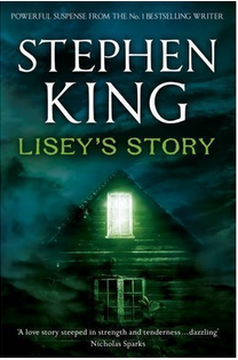 Nobody tells a story quite like Stephen King, who has rated 'Lisey's Story' (2006) his favourite novel that he's written. Before I discovered it on the library shelves, however, I'd not heard of it. No-one has yet made it into a film, and it doesn't seem as well known as other King novels such as 'Carrie', 'The Shining', etc. The novel delivers a powerful and engaging read, however, and is a typical Stephen King page-turner (all 664 of them - it's a long novel!) The plot involves three stories. One is that of Lisey herself, told in the present, interwoven with a second one, revealing her dead husband's life, as recalled by her. The third story is the one from the title, written by Scott for his wife. More about that later. Here's a brief plot summary. Lisey Landon has been widowed for two years, following the sudden death of her husband, hugely successful Maine novelist Scott Landon. Although a devoted husband, Scott was a troubled man during his life, emotionally wrecked by his childhood and prone to drinking bouts. Despite the passing of time, Lisey is still unable to deal with his loss, as evidenced by her inability to clear out his study. Then an insane fan of Scott's begins to stalk her, demanding she hand over her dead husband's papers; in order to survive, Lisey has to follow the trail of clues left by her husband, who assists her in spirit form. Through Scott and Lisey we explore the fantastical world known as Boo'ya Moon, where Scott retreats during times of mental crisis. Boo'ya Moon is a magical realm of warmth, filled with hazy red light, birdsong and the scent of tropical flowers. Dangers lurk amongst the lush vegetation and bright colours, however. Monsters such as Scott's nemesis, the terrible piebald creature he dubs his 'long boy'. This 'long boy' appears to represent total insanity, something desperately feared by Scott, given his family history of mental illness. Despite its perils, however, it is Boo'ya Moon that eventually provides solutions to Lisey, in respect of her insane stalker and her grief over her husband's death. A novel of contrasts and dualities  Stephen King Stephen King For me, the novel is one laden with dualities. The plot portrays many contrasts; good and evil, dark and light, night and day, safe and dangerous, madness and sanity. As for night and day, the difference between them plays an important role in Scott and Lisey's visits to Boo'ya Moon, a place that's safe during daylight hours, but in which unspeakable terrors lurk in the Fairy Forest at night. King stresses that Boo'ya Moon is not a place in which to linger too long; its beauty can be seductive and once enticed into its magic, its guests may lose all desire to leave, despite its perils. Another duality illustrated here; that of danger and safety. Good and evil are demonstrated in Sparky Landon, Scott's father, a man tormented by what Scott terms 'bad-gunky', yet who, in his lucid moments, loves his two sons and endeavours to protect them during their childhood from the rampant family insanity. He doesn't entirely succeed; nobody could endure what Scott did and emerge mentally unscathed. Scott Landon comes from a family blighted by mental illness, which manifests itself as either the 'bad-gunky' of homicidal mania (Scott's brother and father) or as catatonia (Scott himself). Although a loving husband, the man is a dark, haunted individual in comparison with Lisey, who exudes strength and stability. Normally loquacious, Scott suffers bouts of catatonia, as does Lisey's sister, Amanda. The theme of family presents another duality, with Lisey's chaotic yet loving childhood, mostly female, a contrast to Scott's male-dominated and terror-filled one. What does it mean to be a novelist? 'Lisey's Story' as metafiction Let's turn now to another theme that's prevalent in the novel. 'Lisey's Story' is partly an examination of the craft of writing and what it means to be a author. King achieves some of this on a very practical level. Through Lisey and the descriptions of Scott's life, we get to see how a successful novelist works his craft, from the way his study is set up to the descriptions of his public speaking events. On a different level, King also offers one possible answer to the question all novelists get asked - 'where do you get your ideas from?' Scott Landon compares the mythical pool in Boo'ya Moon to a 'word pool' and credits it as the source of his creativity. Interesting, as the pool also has magical healing qualities. Does King mean that writing can be cathartic, a balm to minds in crisis? Possibly. Then there's Boo'ya Moon itself. I interpret this magical realm as representing Scott's mental illness, or to be specific, the state of catatonia. Scott and Amanda are both catatonics who flee to Boo'ya Moon during mental breakdowns; both find peace and healing in this magical world. Is King saying that the source of creativity lies in madness? Or in a retreat from the realities of everyday life? Perhaps. Writing can spring from madness, but it can also present a catharsis for insanity. Another interesting duality! Is the title of 'Lisey's Story' a misnomer? 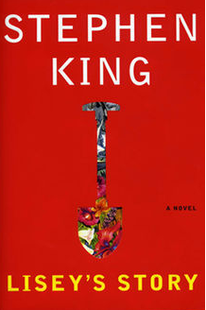 A minor quibble now. For me, the title of the novel is something of a misnomer. The novel is far more concerned about Scott Landon's life rather than Lisey's; she plays a supporting role in her own story. Although we are given details of Lisey's life, throughout the book we discover much more about her husband's. Even when we finally read the story that Scott wrote for Lisey and hid for her in Boo'ya Moon, the 'Lisey's Story' of the title, we learn far more about him than we do his wife, as the missing pieces of his life slot into place. That aside, 'Lisey's Story' is a terrific fairground ride of a novel, told as only Stephen King can. Like many King offerings, it's densely plotted and, although long, it's never dull. From the stunning descriptions of Boo'ya Moon to those of Scott and Lisey's marriage, through the sub-plots of Amanda's mental illness and Lisey's stalking by the insane Jim Dooley, King sweeps us along in a epic story that enchants and intrigues. I heartily recommend this book. Have you read 'Lisey's story'? Did you love it or loathe it? What elements did you enjoy and why? Leave me a comment and let me know.
A collection of King's short stories and poetry 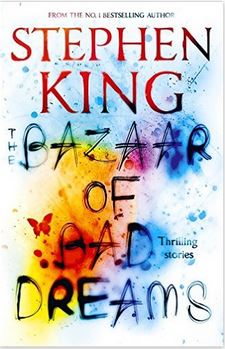 Over the years, I've come to admire Stephen King more and more, both for his prolific output and the amazing quality of his work. I've especially enjoyed his longer novels, such as '11.22.63', marvelling at how he maintains tension and interest for 700+ pages. I wasn't sure, therefore, what I'd think of King's short stories, although I suspect I could read his grocery list and find it enthralling! I needn't have worried - I loved 'Full Dark, No Stars', a great collection and one that inspired me to try 'The Bazaar of Bad Dreams', published in November 2015. It's a collection of eighteen short stories and two poems. (Poetry isn't my thing - I started both poems and gave up, so perhaps I overstated my case when it comes to King's grocery list!) It's worth noting that not all the stories are new; some, such as 'Blockade Billy', have been published before, which may disappoint diehard fans expecting a completely fresh experience. They were all new to me, however, so no complaints here! I love how King prefaces each story with an introduction, often revealing where he got his inspiration. As an author myself, it's fascinating to explore another wordsmith's process for transferring an idea from brain to page. 'Mile 81', for example, is a reworking of a story King wrote nearly forty years ago, resulting from his dislike of a particularly lonely stretch of road in Maine, familiar from his university days. For 'Batman and Robin Have an Altercation', he drew on a memory of a near-miss accident at a Sarasota intersection. The best introduction, however, is the one to the book itself. Here's a snippet from what King has to say: 'Here, sit down beside me. And do come a little closer, I don't bite. Except.... we've known each other for a very long time, and I suspect you know that's not entirely true.' An impressive collection of wonderful quality  So what can the reader expect from 'The Bazaar of Bad Dreams'? Some of the stories, like 'Mile 81' and 'Bad Little Kid', are quintessentially Stephen King - a demonic flesh-eating car reminiscent of his novel 'Christine' in the first, an evil child in the second. Others, like 'The Little Green God of Agony', are more personal; in King's own words, a search for closure. The story resulted from the horrific traffic accident he suffered in 1999 that resulted in years of physiotherapy and learning to walk again. In keeping with the personal theme, his preface to 'Afterlife', an examination of what might come after death, King admits to an increasing interest in the subject as he grows older. The story reflects his preoccupation but delivered with a humorous touch. What awaits Bill Andrews after his demise is not a date with St Peter but with a man in high-waisted trousers, who's none too pleased to see him... My favourite is, I think, 'Ur', although it's a tough choice! 'Ur' deals with, of all things, a supernatural Kindle, which proves that a good author can weave a tale out of just about anything. Talking of which, the preface to 'Mr Yummy' intrigued me. I can't imagine telling Stephen King he wouldn't have anything new to say about AIDS! A friend of his did just that, with King, of course, proving him wrong with his wonderful story of a elderly gay man approaching his death in a care home. What else gets the King touch? Marriage, in 'Premium Harmony', 'Under the Weather' and 'Morality'; human stupidity in 'Drunken Fireworks'; and a post-apocalyptic world in 'Summer Thunder', a moving tale of a man and his dog that incorporates King's love of motorcycles. 'Blockade Billy' is centred around baseball, but with a dark twist. I loved 'The Dune', a tale of supernatural writing and a study of a deeply unpleasant man. Stephen says the story has one of his favourite endings and I agree; it's a cracker! An amazing talent, honed to a razor's edge In short, there's something here for every King fan, whether old or new. This is an impressive collection of wonderful quality from a writer whose talent, after over forty years, has been honed to a razor's edge.
A gripping thriller that's also heart-breaking 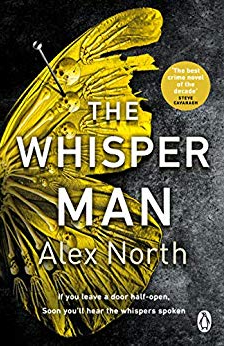 What a gorgeous cover! What a gorgeous cover! Wow! Yesterday I finished Alex North's best-selling novel 'The Whisper Man', and loved it. Two of the scenes towards the end of the book brought tears to my eyes. Not many books manage to do that, but it's wonderful when they do. I had my doubts when I first picked up 'The Whisper Man', however. We're introduced early in the novel to DI Pete Willis, a man with a troubled childhood, a divorce in his rear mirror and a drinking problem. Cliché number one. Then there's the plot. A boy has gone missing, in circumstances that mirror the crimes of Frank Carter, now in prison. Is a copycat killer at work? Cliché number two. Except that 'The Whisper Man' is so beautifully written, and Alex North provides such a fresh spin on an old tale, that I couldn't help but get drawn in. I'm glad I did. The book was rated the best crime novel of the decade by Steve Cavanagh, and he's someone who knows how to craft an excellent read! Here's a taster of the plot: If you leave a door half-open, soon you'll hear the whispers spoken . . . Still devastated after the loss of his wife, Tom Kennedy and his young son Jake move to the sleepy village of Featherbank, looking for a much-needed fresh start. But Featherbank has a dark past. Fifteen years ago, a twisted serial killer abducted and murdered five young boys. Until he was finally caught, the killer was known as 'The Whisper Man'. Of course, an old crime need not trouble Tom and Jake as they try to settle in to their new home. Except that now another boy has gone missing. And then Jake begins acting strangely. He says he hears a whispering at his window . . . A novel of loss, love and the relationship between father and son Creepy stuff, huh? Yet underneath all the horror the book deals with themes of grief, loss and love. Alex North masterfully portrays a father, still mourning for his dead wife, who struggles to understand his young son. They love each other, yet don't communicate well; Tom feels he's failing as a parent, while Jake believes he disappoints his dad. Both are wrong, yet it takes tragedy to convince them otherwise. I've already said that DI Pete Willis appears at first to be a cliché. Yet Alex North hasn't made him that way out of laziness; reasons exist why the plot needs this character to suffer a troubled childhood and why he descended into alcoholism in the past. It all forms part of a coherent whole, as does the fact there's a copycat killer. Along the way Alex North delivers great plot twists - one, about halfway through, stunned yet delighted me! In the same way, he avoids taking the easy option towards the end; when he could have delivered a nice, comfy happy-ever-after, he choose something different, in the first of the two chapters that made me cry. Here the writing could, in the hands of a lesser author, have descended into cheesiness, but it didn't. Instead, it was beautiful. So, too, was a later scene, in which we discover Alex has misled us as to the identity of one of the minor characters. I won't say more, as I don't want to give plot spoilers, but the wrap-up is excellent, including the fate of the copycat killer, who gets what he deserves as well as what he craves. If you enjoy great crime fiction, do yourself a favour and read this book. At times spine-chillingly tense and at others heart-breaking, this is one of the best crime novels I've read this year. What about you? Have you read 'The Whisper Man'? If so, what did you think? Liked it, loathed it? Leave a comment and let me know!
A novel of violence and suffering... 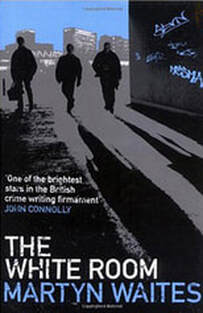 'The White Room' by Martyn Waites is one of the best, as well as one of the grittiest, novels I've read in a long time. In it, Waites fuses a fictional account of life in Newcastle with the real-life case of child-killer Mary Bell. Be warned – this novel is not for the fainthearted. From its first chapter, set in a slaughterhouse, the narrative examines child abuse, prostitution, brutal anal sex, gang violence and murder, with a few psychopaths thrown in for good measure. Throughout the bulk of the novel, the characters endure a relentless cycle of damage, often perpetuated from generation to generation, as in the case of Monica and Mae Blacklock. Furthermore, Martyn Waites avoids the fairy tale scenario of only making his bad characters – and there are plenty of those - suffer. In 'The White Room', nobody is exempt from the torment that Waites inflicts on them; the characters who are essentially decent people – Sharon, Jack, Bert, Joanne – also endure more than their fair share of death and sorrow. But also one of redemption  Author Martyn Waites Author Martyn Waites The ending, therefore, impacts like a bolt out of the slaughterhouse stun gun from the first chapter. Initially, it seems a little unreal – the soft-focus emphasis on what the future holds for Mae Blacklock, the character based on Mary Bell. After so much suffering and violence, one way to end the novel would have been to abandon all idea of hope, as George Orwell did in ‘1984’. However, Martyn Waites doesn't take this approach. Instead, he offers us a more optimistic alternative. Hence the title of the novel - 'The White Room'. An echo from Mae Blacklock’s childhood, a white room complete with an image of Jesus on the cross, simultaneously portraying hope and suffering. One that offers the reader more optimistic possibilities after the raw brutality of the rest of the novel. After all, if a character as fundamentally damaged as Mae Blacklock can aspire to a better future, so can we all. Martyn Waites himself says ‘It's a dark book but, I think, not without a redemptive ending. Because there has to be redemption. Otherwise, what's the point?’ The White Room may shock you. It may horrify you. Or its implicit message may inspire you. Whatever your reaction, I'd be interested to hear your views. Post a comment for me! More about the author Martyn is also the author of 'The Woman in Black: Angel of Death' as well as the Joe Donovan and Stephen Larkin series of novels. You can find out more at www.martynwaites.com.
Following his excellent review of 'The Two Faces of January', I'm delighted to welcome back Michael Nutt as a guest blogger. Today's post will be a review by him of Elmore Leonard's 1987 novel 'Bandits'. The floor's all yours, Michael... Snappy dialogue and interesting characters... 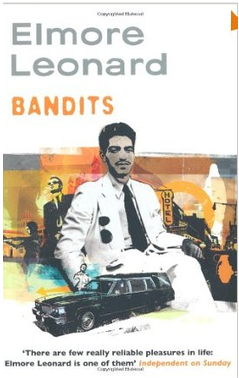 Written during a period when Elmore Leonard was turning out some of his very best crime fiction, 'Bandits' (1987) is written with the author's customary ease and economy, full of his snappy dialogue, a cast of interesting characters, and a plot that picks up pace along the way. The story begins with a corpse, in a place where death is everyday business. We are in a mortuary in New Orleans and two men are working on a road traffic victim. The scene is set with some rapid fire dialogue between the two men as they work on the body. Or rather while one man works on it, while the other watches evasively. The evasive one is Jack Delaney, just turned forty, a one-time fashion model who ended up doing time in Angola penitentiary for burglary, and now working for his brother-in-law Leo Mullen who got him an early release through the rehabilitation programme by offering him a job as assistant in his funeral director's business. It is clear from the start that Jack has not put his criminal past completely behind him. First there is the body that has appeared that day on the mortuary slab, and which Jack recognises as an acquaintance from his wild years. Then there is the revelation that he has been socialising with red-headed Helene, another character from his criminal past. A scathing comment on US foreign policy  The leprosarium at Carville The leprosarium at Carville Soon Jack is on his way to the leper colony in Carville in the company of a nun, Sister Lucy, only the body they are going to collect in the hearse is not a dead one. And Sister Lucy, in her Calvin Klein jeans and heels, appears very well-attired for a woman of the cloth. This is a slow-burner by Leonard's standards and the story takes a while to ignite. The plot has a conventional, linear structure - very different to the author's usual cross-cutting chapters that leap between characters and locations before bringing all the strands together. Written in the late 1980s, Leonard draws on the wars of Central America of the late 20th century - the conflicts in Nicaragua, Honduras - as a background to the contemporary story, introducing themes of responsibility and morality that have been lacking in Jack's life. There is more than a touch of bitterness in the way Leonard remarks on the USA's involvement in those dirty little wars in Central America. He does not spare his American readers the uncomfortable truths of US foreign policy and how it supported the most vicious and inhuman parties in those struggles. Leonard is angry, very angry, as he writes of the atrocities the US financed in Nicaragua in the name of anti-Communism. An unlikely wild bunch  Nicaraguan contra militia Nicaraguan contra militia The bad guys are often the most interesting characters in Leonard's crime novels and he keeps us waiting to meet the villain of this story. Bertie - Colonel Dagoberto Godoy Diaz - is an officer who served the deposed Nicaraguan dictator Somoza and he has a personal interest in the girl that Jack and Lucy have taken out of Carville. He is on their case, while visiting the States to raise funds for his army of contras still fighting the Sandinista government in Nicaragua. Lucy's father, a wealthy oil tycoon, could be just the man to help him. It is almost a third of the way into the story before we meet Colonel Diaz and we are left in no doubt about what Jack and Lucy are up against. The Colonel has the CIA and some smooth operators working on his side and Jack is going to need help from some people from his criminal past, so he calls on a couple of bandits: ex-cop Roy Hicks, whom Jack knew in Angola, and old lag Tom Cullen, recently released from a 27 year stretch into the care of a nursing home. This unlikely wild bunch have a chance of redemption, of using their criminal skills for the force of good against evil. But with their criminal backgrounds, will they stay as the good guys or succumb to the temptation of more than two million dollars? Take a trip in Jack's hearse  Beautiful New Orleans Beautiful New Orleans I love this novel's New Orleans setting, the familiar street names and locales. I love the anecdotes that Leonard drops in to fill out the main characters' back-stories, each one a short story in itself. I love the way that Leonard will follow a plot thread and character for a while before leaving it and moving off in an entirely different direction. I love how this leaves the story open to so many possibilities, not just with the bandits' quest to steal the Colonel's funds but also in their relationships with each other. The story builds to its climax, with some twists and turns along the way, raising our anticipation like watching a car bomb primed to go off. It ends as it begins, with a live body being transported in a hearse. But we have come a long way in between, and so too have his characters. 'Bandits' is not up there with Leonard's best novels, but it is a thoroughly good read. Take a trip in Jack's hearse: it is a journey worth taking. More about Elmore Leonard 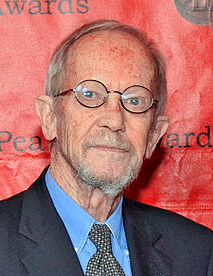 Novelist Elmore Leonard Novelist Elmore Leonard Thank you, Michael, for another great book review! A few facts about the novelist Elmore Leonard. Born in New Orleans in 1925, his family moved to Detroit in 1934, where he spent much of his life. His earliest novels, published in the 1950s, were Westerns. He went on to pen several crime and thriller novels, the best known of which include 'Get Shorty' and 'Rum Punch'. Many of these, including 'Bandits', have been made into films and adapted for television. During his lifetime, Leonard was awarded various prestigious literary prizes, including the Grand Master Edgar Award in 1992 from the Mystery Writers of America, and the F. Scott Fitzgerald Literary Award for outstanding achievement in American literature in 2008. Elmore Leonard died in 2013, aged 87. |
Categories
All
Subscribe to my blog!
Via Goodreads
|
Join my Special Readers' group and receive a free copy of 'Blackwater Lake'!
|
Privacy policy Website terms and conditions of use
Copyright Maggie James 2018 - current date. All rights reserved.
Copyright Maggie James 2018 - current date. All rights reserved.
 RSS Feed
RSS Feed
